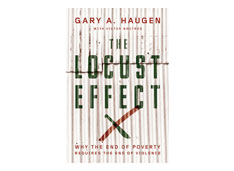From an op-ed in the Washington Post by Gary Haugen, President & CEO of International Justice Mission, author of the upcoming book The Locust Effect (out on February 3):
If you’ve been a tourist or business traveler recently in Kenya, India, Guatemala or any other developing country, you probably saw uniformed guards in the stores and offices you visited or hotels where you slept. The sight of these guards is so common that their presence most likely faded into the background. But they are emblematic of a massive social transformation that is passing unnoticed: Throughout the developing world, public justice systems are being replaced with private systems of security and dispute resolution. The implications for the world’s poorest people are devastating.
Businesses and economic elites in developing countries left frustrated by incompetent police, clogged courts and hopelessly overburdened judges and prosecutors are increasingly circumventing these systems and buying their own protection. In India in late 2010 the private security industry already employed more than 5.5 million people — roughly four times the size of the entire Indian police force. A 2009 World Bank report showed roughly the same ratio in Kenya. The largest employer in all of Africa is a private security firm, Group4Securicor, and in Guatemala, private security forces outnumber public police 7 to 1.
The repercussions extend far beyond the elites and businesses that buy safety: When protection must be purchased, the poorest are left with nothing to shield them from violence. In many developing countries, if you want to be safe, you pay to be safe. And if you can’t pay to be safe — you aren’t.
Read the full piece here.